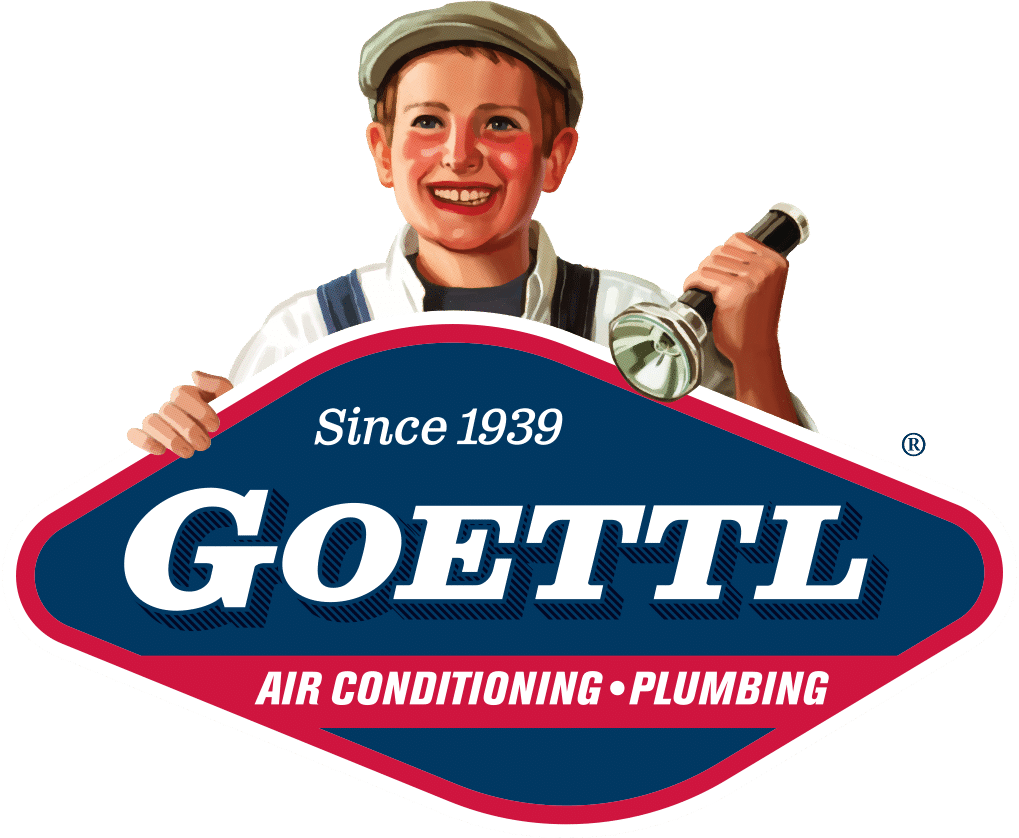
How Does My Air Conditioner Actually Cool My Home?
In the scorching summer heat, your AC is your best friend. But have you ever wondered how keeping your home cool and comfortable works? This guide explores the fascinating process behind air conditioning and how it keeps you cool even in the hottest weather. For professional air conditioning services, trust the experts at Goettl Air Conditioning & Plumbing.
Understanding the Basics: How Does an Air Conditioner Work?
Contrary to popular belief, air conditioners don’t generate cool air. Instead, they remove heat from your home’s indoor air. This process is made possible by a crucial component called refrigerant. Here’s how it works:
1. Absorbing Heat
The refrigerant is vital in the cooling process. As it circulates through the evaporator coil inside your home, it undergoes a phase change from liquid to gas. At this stage, the refrigerant absorbs heat from the warm indoor air blowing over the coil.
This heat absorption makes the refrigerant evaporate, turning it into a low-pressure gas. The now-cooled air is distributed throughout your home via the ductwork, providing a comfortable indoor environment.
2. Removing Heat
Once the heat gets absorbed by the refrigerant and turned into a gas, it travels to the unit outside, where it gets compressed, raising its temperature and pressure. This high-pressure and hot gas then transfers to the condenser coil located in the outdoor unit. As the outdoor air blows over the coil, the heat from the refrigerant is emitted into the outdoor air. It causes the refrigerant to condense back into a liquid state.
3. Releasing Heat
The heat absorbed by the refrigerant in your home must be released outside to complete the cooling cycle. The hot, high-pressure refrigerant gas travels through the outdoor condenser coil. The condenser coil is built to dissipate heat efficiently into the outdoor air. As the refrigerant releases heat and cools down, it becomes liquid. This liquid then flows back to the indoor evaporator coil to repeat the cooling cycle.
4. Recirculating
The compressor is often called the air conditioning system’s heart because it circulates the refrigerant. Once the refrigerant has absorbed heat and turned into a gas in the evaporator coil, it makes its way to the outdoor unit where the compressor is located. The compressor’s primary function is to pressurize the refrigerant gas, raising its temperature immensely.
This hot, high-pressure gas then transfers to the condenser coil, emitting heat into the outdoor air and condensing back into a liquid, which then travels back to the indoor evaporator coil to absorb more heat from the indoor air. This continuous cycle of absorbing heat, releasing heat, and recirculating the refrigerant allows the air conditioner to maintain the desired indoor temperature.
The compressor’s ability to efficiently circulate the refrigerant is essential for the air conditioner’s operation. If the compressor fails or malfunctions, it can cause issues such as insufficient cooling or complete system failure.
By understanding how your air conditioner works to cool your home, you can better appreciate the importance of regular maintenance and timely repairs. If you see any issues with your air conditioner, such as reduced cooling performance or strange noises, you must contact professional air conditioning services for inspection and repair.
Regular maintenance allows your AC to operate efficiently and effectively, keeping your home comfortable during the hottest months. Or you may want to invest in a new AC if you’re existing unit seems past the point of repair.
Choosing the Right Air Conditioner for Your Home
The right air conditioner is crucial for optimal performance and energy efficiency. For example, an oversized unit will cool your place faster but may cycle on and off frequently, leading to higher energy bills and uneven cooling. On the other hand, an undersized unit will find it hard to cool your home effectively, leading to discomfort and potential system damage.
Factors to Consider When Choosing an AC
When selecting an air conditioner, you need to consider several things to choose the right system for your home. From your home’s size to energy efficiency ratings, each factor is vital in determining the effectiveness and cost-effectiveness of your air conditioning system. Here are the factors you need to consider when choosing an AC for your home:
- Home Size: The size of your home is crucial in determining the size of the air conditioner you need. A larger home will necessitate a larger unit to cool effectively. However, avoiding oversized units is essential, as they can cause inefficient operation and increased energy costs. Consulting with a professional HVAC technician can help you know the right size for your home based on factors like square footage, height of the ceiling, and insulation.
- Insulation and Sealing: Proper insulation and sealing of your home’s doors and windows are essential for energy efficiency. A well-insulated and sealed home will require a smaller, more efficient air conditioner to maintain comfortable temperatures. Insulating your attic, walls, and floors and sealing any gaps or cracks can help reduce the workload on your AC unit and lower your energy bills.
- Climate: The climate in your area is also important in determining the size and type of air conditioner you need. Hotter climates may require larger units or additional cooling capacity to maintain comfortable indoor temperatures. Additionally, humidity levels can affect your comfort, so it’s essential to consider a unit with dehumidification capabilities in humid climates.
- Energy Efficiency: Look for air conditioners with high energy efficiency ratings (SEER ratings) to save on energy costs in the long run. Energy-efficient units use less energy to cool your home, lowering your carbon footprint and energy bills. Some energy-efficient ACs may also qualify for rebates or incentives, further reducing your upfront costs.
Installing Your New Air Conditioner
Once you’ve chosen the right air conditioner for your home, it’s time to install it. Professional installation ensures your new AC unit operates efficiently and effectively. An experienced HVAC technician will properly size and install your new AC, ensuring optimal performance and energy efficiency.
Maintaining Your Air Conditioner for Longevity
You may not need to spend on a new AC anytime soon if you regularly maintain your existing one. Regular maintenance can keep your unit operating smoothly and efficiently. Here are some ways you can maintain your AC unit:
1. Change Air Filters
Changing your air filters regularly is vital for maintaining your AC’s efficiency and improving indoor air quality. Blocked or dirty filters can limit airflow, which will make your AC work harder and require more energy. Also, dirty filters can lead to poor indoor air quality, exacerbating allergies and respiratory issues. Aim to change your filters every couple of months, depending on usage and the type of filter used.
2. Clean the Condenser Coils
Over time, dirt, debris, and grime can form on your AC’s condenser coils, reducing its efficiency. Regularly cleaning the coils can help maintain optimal performance. To clean the coils, shut off the power to the unit and use a soft brush or a vacuum cleaner that comes with a brush attached to it for removing dirt and debris gently. Be careful not to twist or damage the fins on the coils.
3. Check Refrigerant Levels
Low refrigerant levels indicate a leak in your AC system, which affects its cooling capacity. If your AC is not cooling as effectively as it should, or if you hear a hissing sound from the unit, it may be a sign of low refrigerant levels. Have a professional HVAC technician check and refill the refrigerant levels as needed to ensure optimal performance.
4. Schedule Annual Maintenance
Annual maintenance by a professional can keep your AC running smoothly. During a maintenance visit, the technician will inspect and clean various components of your AC system, check for any potential problems, and ensure that your system is operating properly. Performing maintenance regularly can help you avoid expensive repairs and increase the life of your AC.
Schedule Your HVAC Service Today!
At Goettl Air Conditioning & Plumbing, we can help keep you cool and comfortable all year round. Whether you need new air conditioning services for installation, maintenance, or repair, we have the right expertise and people to help you out. Contact us today for your HVAC service and experience the Goettl difference!








































































































































































































